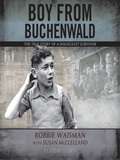Résultats de recherche de titre
Articles 1 à 2 sur 2

Boy from buchenwald
Par Robbie Waisman. 2021
DAISY audio (Téléchargement direct), DAISY audio (Zip)
Histoire (biographies), Guerre
Audio avec voix humaine
It was 1945 and Romek Wajsman had just been liberated from Buchenwald, a brutal concentration camp where more than 60,000…
people were killed. He was starving, tortured, and had no idea where his family was—let alone if they were alive. Along with 472 other boys, including Elie Wiesel, these teens were dubbed "The Buchenwald Boys." They were angry at the world for their abuse, and turned to violence: stealing, fighting, and struggling for power. Everything changed for Romek and the other boys when Albert Einstein and Rabbi Herschel Schacter brought them to a home for rehabilitation Romek Wajsman, now Robbie Waisman, humanitarian and Canadian governor general award recipient, shares his remarkable story of transforming pain into resiliency and overcoming incredible loss to find incredible joy
NISHGA
Par Jordan Abel. 2020
Braille (abrégé), Braille électronique (abrégé), DAISY Audio (Téléchargement Direct), DAISY Audio (Zip), DAISY texte (Téléchargement direct), DAISY texte (Zip), Word (Zip), ePub (Zip)
Peuples autochtones (biographies), Journaux personnels et mémoires, Essais et documents généraux
Audio avec voix de synthèse, Braille automatisé
From Griffin Poetry Prize winner Jordan Abel comes a groundbreaking, deeply personal, and devastating autobiographical meditation that attempts to address…
the complicated legacies of Canada's residential school system and contemporary Indigenous existence.As a Nisga'a writer, Jordan Abel often finds himself in a position where he is asked to explain his relationship to Nisga'a language, Nisga'a community, and Nisga'a cultural knowledge. However, as an intergenerational survivor of residential school--both of his grandparents attended the same residential school--his relationship to his own Indigenous identity is complicated to say the least.NISHGA explores those complications and is invested in understanding how the colonial violence originating at the Coqualeetza Indian Residential School impacted his grandparents' generation, then his father's generation, and ultimately his own. The project is rooted in a desire to illuminate the realities of intergenerational survivors of residential school, but sheds light on Indigenous experiences that may not seem to be immediately (or inherently) Indigenous. Drawing on autobiography and a series of interconnected documents (including pieces of memoir, transcriptions of talks, and photography), NISHGA is a book about confronting difficult truths and it is about how both Indigenous and non-Indigenous peoples engage with a history of colonial violence that is quite often rendered invisible.